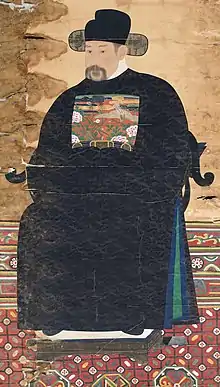Yun Hyu
Yun Hyu (* 14. Oktober 1617 in Seoul; † 20. Mai 1680) war ein koreanischer Philosoph, Dichter, Politiker und Künstler. Er war Anführer der politischen Fraktion Namin (남인). Pseudonyme waren Baikho (백호) und Haheon (하헌).[1]
| Koreanische Schreibweise | |
|---|---|
| Hangeul | 윤휴 |
| Hanja | 尹鑴 |
| Revidierte Romanisierung |
Yun Hyu |
| McCune- Reischauer |
Yun Hyu |

Yun Hyu
1660 wurde er zur Hauptfigur einer Kontroverse über die Trauerrituale um König Hyojong.[2] 1674 war er wiederum in eine Kontroverse verwickelt, dieses Mal über den Tod der Königin Inseon. 1680 wurde ihm nach einer langen öffentlichen Debatte mit Song Si-yeol von König Sukjong befohlen, Selbstmord zu begehen.[3]
Werke
- Baikhojunseo (백호전서, 白湖全書)
- Baikhodokseogi (백호독서기, 白湖讀書記)
- Juryeseol (주례설, 周禮說)
- Hongbeomseol (홍범설, 洪範說)
- Jungyongdaehakhoosul (중용대학후설, 中庸大學後說)
- Jungyongseol (중용설, 中庸說)
- Bailhojip (백호집, 白湖集)
Weblinks
- Yun Hyu in der Doosan-Enzyklopädie (koreanisch)
- Yun Hyu auf Daum Communications (koreanisch)
- Yun Hyu (Memento vom 9. Juli 2012 im Webarchiv archive.today) auf nate.com (koreanisch)
- Yun Hyu auf people.aks.ac.kr (koreanisch)
Einzelnachweise
- Andrei Lankov (1990): Controversy over Ritual in 17th Century Korea. Seoul Journal of Korean Studies 3: S. 49–64.
- Andrei Lankov (1990): Controversy over Ritual in 17th Century Korea. Seoul Journal of Korean Studies 3: S. 53
- Kumio Miura: Orthodoxy and Heterodoxy in Seventeenth-Century Korea: Song Siyol and Yun Hyu. In: de Bary, Wm. Theodore, ed. (Hrsg.): The Rise of Neo-Confucianism in Korea. Columbia University Press, NY 1985, S. 436, S. 411–444.
This article is issued from Wikipedia. The text is licensed under Creative Commons - Attribution - Sharealike. The authors of the article are listed here. Additional terms may apply for the media files, click on images to show image meta data.